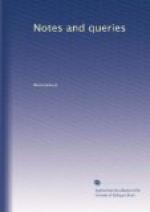Indeed, I very much doubt whether our word “News” contains the idea of “new” at all. It is used with us to mean intelligence and the phrases, “Is there any thing new?” and “Is there any news?” present, in my opinion, two totally distinct ideas to the English mind in its ordinary mechanical action. “Intelligence” is not necessarily “new”, nor indeed is “News:” in the oldest dictionary I possess, Baret’s Alvearie, 1573, I find “Olde newes or stale newes.” A.E.B. is very positive that “news” is plural, and he cites the “Cardinal of York” to prove it. All that I can say is, that I think the Cardinal of York was wrong: and A.E.B. thought so too, when his object was not to confound me, as may be seen by his own practice in bloc concluding paragraph of his communication:—“The newes was of the victory,” &c. The word “means,” on the other hand, is beyond all dispute plural. What says Shakspeare?
“Yet nature is made letter by no
mean
But nature makes that mean.”
The plural was formed by the addition of “s:” yet from the infrequent use of the word except in the plural, the singular form has become obsolete, and the same form applies now to both numbers. Those who would apply this reasoning to “News,” forget that there is the slight difficulty of the absence of the noun “new” to start from.
I do not feel bound to furnish proof of so obvious a fact, that many of the most striking similarities in language are mere coincidences. Words derived from the same root, and retaining the same meaning, frequently present the most dissimilar appearance, as “eveque” and “bishop;” and the most distant roots frequently meet in the same word. When your correspondents, therefore, remind me that there is a French word, noise, I must remind them that it contains not one element of our English word. Richardson gives the French word, but evidently discards it, preferring the immediate derivation from “noy, that which noies or annoys.” I confess I do not understand his argument; but it was referring to this that I said that our only known process would make a plural noun of it. I have an impression that I have met with “annoys” used by poetical license for “annoyances.”




